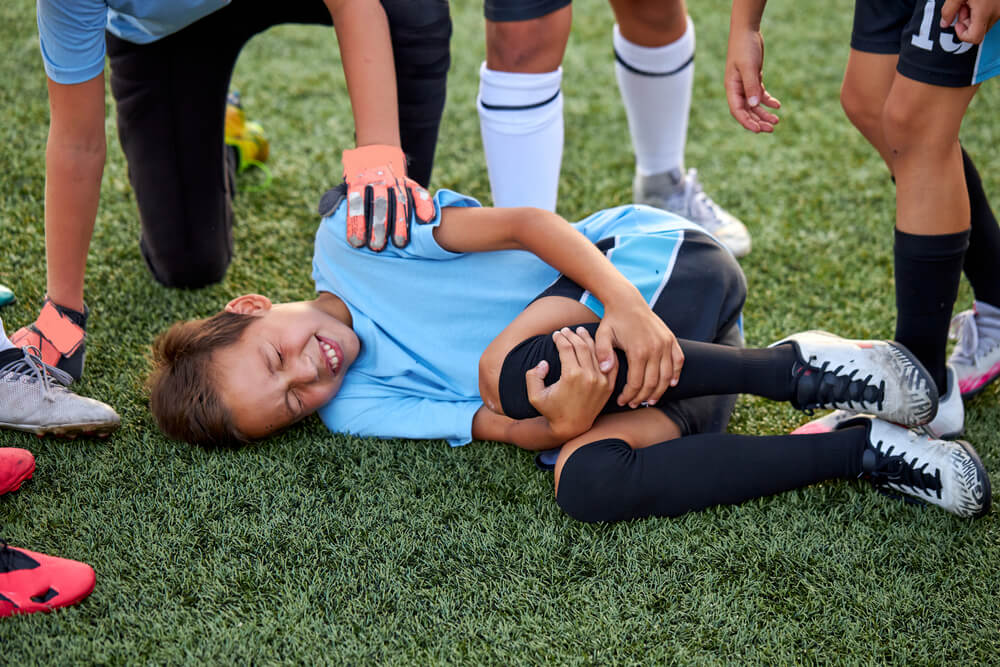What Is a Sports Physical?
Pre-participation examination or a “Sports Screening Physical Exam” as it is sometimes called—a sports physical –is required to be submitted to your child’s school, usually to the athletic trainer, before participating in practice or play. A child physical exam or teen physical examination that is a sports physical is not the same as a “well-child” appointment but we can arrange to combine the two if that is needed. We’re the experts in sports medicine for child patients in the Plantation and Doral, Florida areas, and we know what to do to help your child get all the needed documentation for a great sports season.
Your kid might ask you, “What is a sports physical?” Explain that a sports physical is something that all the other kids are getting and that even the pros get sports physicals all the time! If your child athlete is quite young, or reluctant to go to the doctor, be assured that for years, we have been helping every child feel comfortable in our offices. Let them know that getting a sports physical doesn’t mean that there’s anything wrong. It usually only takes about 15 minutes for you to fill out the child’s “history.” Sometimes that can be done online ahead of time. Experts say that most of the time, this is the most important part of the physical. The history portion of the form is often the largest part. Once your child is in the exam room, it will only take about 10 to 15 minutes for most kids. It rarely involves any procedures or needles—so no big deal!
When Should Your Kid Get a Sports Physical?

Kids of all ages who are in school athletics, whether public or private school, need these child physical exams. When should your child get a sports physical even if he or she is not in athletics? You might want to see that they get checked before taking part in dance or martial arts classes too, even if no form is required. Maybe a grandparent or new coach is wondering, “When should your kid get a sports physical?”
Bottom line: it’s required for getting out of the starting gate, usually by state law or school district policy.
Why Should Your Child Get a Sports Physical?
Each year, about 2.6 million children go to the emergency room with a sports or recreation-related injury. Schools require a child or teen physical examination because they want your child to be safe and healthy, and you have peace of mind knowing all your child’s teammates have been checked out too.
According to the American Academy of Pediatrics, the general goals of the child physical exam include identifying any risks to your child in playing the sport, such as heart issues, breathing, or vision problems, that might have gone undetected. One family practice doctor who has done sports physicals for forty years estimates that about 5% of these exams result in finding a previously-undiagnosed issue in the young patient. It may be scoliosis, a heart murmur, or asthma.
Another goal according to the American Academy of Pediatrics is to make sure that your youngster has a “medical home”—a health provider like us, that is patient-centered, team-based, comprehensive, and accessible. We offer this kind of care every day.
If our exam brings a condition to light, we can talk with you and your child about how to prevent any further problems and what are the means of protecting your child from injury, while letting them have the best possible experience with sports.
In years past, whole teams were lined up for an assembly line-type exam, even outdoors. But the Academy recommends the exam take place in a physician’s office and not in a group context. The teen physical exam may include discussion of a girl’s menstrual cycle, and screening of kids for things like stress, depression, hernias, and drug use, which makes privacy important.
These days a lot of kids play a single sport daily, making them vulnerable to overuse injury. Even first graders can develop this problem. The sports physical appointment gives you a chance to talk with us about cross-training, attitude, and rest—things that involve the whole family.
Your child may well end up playing and practicing in venues and in weather you didn’t anticipate. Let us help you discuss all the eventualities. A third of childhood injuries result from playing some type of sport. But the benefits far outweigh the risks! We want your child to get out on the court or field, in the healthiest of ways.
How Long Does a Sports Physical Last?/ How Long Are Sports Physicals Good For?
The certificate signed by your health provider is good for a calendar year. However, the document isn’t usually “transferable” from one school to another so your child will probably need a new sports physical if a different form is required.
Another reason people might ask, “How long does a sports physical last?” is when their child starts a new sport or a new season of the same sport. Usually, the form is good for 365 days. Kids change so fast that it makes sense to check them out annually before the challenge of athletics comes back around. And as kids grow older, the rules of the game, such as length of play periods and competition guidelines, grow with them.
Does a Sports Physical Last Even After a Child Has Had an Injury?

Yes, but your youngster may need a doctor’s note to return to play. We can advise you on when your kid should be able to get back on the field. For example, if a bone was broken, growth plates must be protected so that the child continues not just to heal but to grow, and not be susceptible to further injury at that site.
Does Anyone Ever Fail to Pass a Sports Physical?
According to the journal American Family Physician, only about 1% of athletes screened in sports physicals are disqualified from any participation. Some conditions that might cause such a disqualification include a prior concussion, a serious knee injury, uncontrolled seizures, and sickle cell anemia. Usually, the form will include a space for us to note any precautions your child needs, or even rehabilitation recommended if an injury happened previously. Current guidelines also address returning to the team after recovering from Covid-19.
Contact Us to Schedule a Visit
When you bring your child to us for these needs, make sure you bring medication lists, vaccination records, and any questions you or the child has. We can advise you on proper equipment, diet and hydration, and techniques for successful, safe practice and competition.
From stretching and warming up to managing exercise-induced asthma, from psycho-social skill concerns to vaccination updates, we are the caring experts for your kids in the area of sports medicine.
Call our Plantation or Doral office today.



